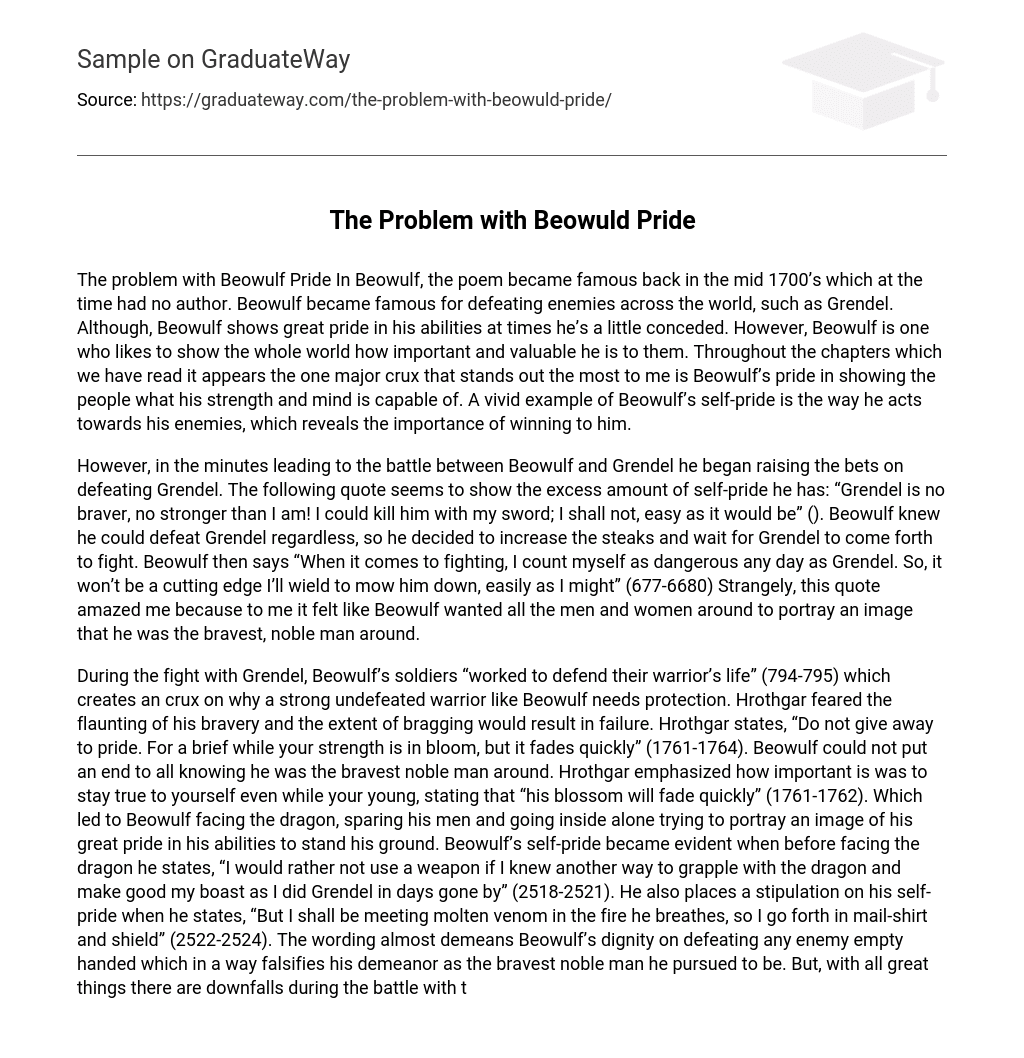The problem with Beowulf Pride In Beowulf, the poem became famous back in the mid 1700’s which at the time had no author. Beowulf became famous for defeating enemies across the world, such as Grendel. Although, Beowulf shows great pride in his abilities at times he’s a little conceded. However, Beowulf is one who likes to show the whole world how important and valuable he is to them. Throughout the chapters which we have read it appears the one major crux that stands out the most to me is Beowulf’s pride in showing the people what his strength and mind is capable of. A vivid example of Beowulf’s self-pride is the way he acts towards his enemies, which reveals the importance of winning to him.
However, in the minutes leading to the battle between Beowulf and Grendel he began raising the bets on defeating Grendel. The following quote seems to show the excess amount of self-pride he has: “Grendel is no braver, no stronger than I am! I could kill him with my sword; I shall not, easy as it would be” (). Beowulf knew he could defeat Grendel regardless, so he decided to increase the steaks and wait for Grendel to come forth to fight. Beowulf then says “When it comes to fighting, I count myself as dangerous any day as Grendel. So, it won’t be a cutting edge I’ll wield to mow him down, easily as I might” (677-6680) Strangely, this quote amazed me because to me it felt like Beowulf wanted all the men and women around to portray an image that he was the bravest, noble man around.
During the fight with Grendel, Beowulf’s soldiers “worked to defend their warrior’s life” (794-795) which creates an crux on why a strong undefeated warrior like Beowulf needs protection. Hrothgar feared the flaunting of his bravery and the extent of bragging would result in failure. Hrothgar states, “Do not give away to pride. For a brief while your strength is in bloom, but it fades quickly” (1761-1764). Beowulf could not put an end to all knowing he was the bravest noble man around. Hrothgar emphasized how important is was to stay true to yourself even while your young, stating that “his blossom will fade quickly” (1761-1762). Which led to Beowulf facing the dragon, sparing his men and going inside alone trying to portray an image of his great pride in his abilities to stand his ground. Beowulf’s self-pride became evident when before facing the dragon he states, “I would rather not use a weapon if I knew another way to grapple with the dragon and make good my boast as I did Grendel in days gone by” (2518-2521). He also places a stipulation on his self-pride when he states, “But I shall be meeting molten venom in the fire he breathes, so I go forth in mail-shirt and shield” (2522-2524). The wording almost demeans Beowulf’s dignity on defeating any enemy empty handed which in a way falsifies his demeanor as the bravest noble man he pursued to be. But, with all great things there are downfalls during the battle with the dragon Beowulf got struck with a venomous bite which left him vulnerable.
A brave handpicked solider Wiglaf uttered these words upon running to defend Beowulf: Go on dear Beowulf, do everything you said you would when you were still young and vowed you would never let your name and fame be dimmed while you lived. Your deeds are famous, so, stay resolute, my lord, defend your life now with the whole of your strength. I shall stand by you. (2663-2668). Beowulf found his strength and drew a “stabbing knife” (2703) at his side, and the narrator says Beowulf “dealt it a deadly wound” (2705). Beowulf then states, In spite of his wounds, mortal wounds, he still spoke for he well knew his days in the world had been lived out to the end –his allotted time was drawing to a close, death was very near. (2724-2728) In order, to maintain his well legacy as a warrior full of pride he uttered his last words thanking god for allowing him to stow in the gold asking god : “Now that I have bartered my last breath to own this fortune, it is up to you to look after their needs”(2799-2801) which reveals the respect and gratitude Beowulf has towards his men, even if it means having to swallow his pride and “give thanks” (2795).
Another strange symbol towards the end of the story was when Beowulf knew he was going to die from the dragons “sharp fangs into his neck” (2691-2692) he gave strict orders on how he wanted to be buried with his very last breath: Order my troops to construct a barrow on a headland on the coast, after my pyre cooled. It will loom on the horizon at Hronesness and be a reminder among the people – so that the coming times crew under sail will call it Beowulf’s Barrow, as they steer ships across the wide and shrouded waters. (2802-2808) This portrayed an image of regardless of him dying he wanted the people who tread the water for years to come to know where he defeated the dragon and that his presence will always be near. Overall, Beowulf had all the qualities of a great epic hero. Loyalty, strength and his pride throughout the story created an image that greatly enriches the readers attention towards the way heroic heroes act.





